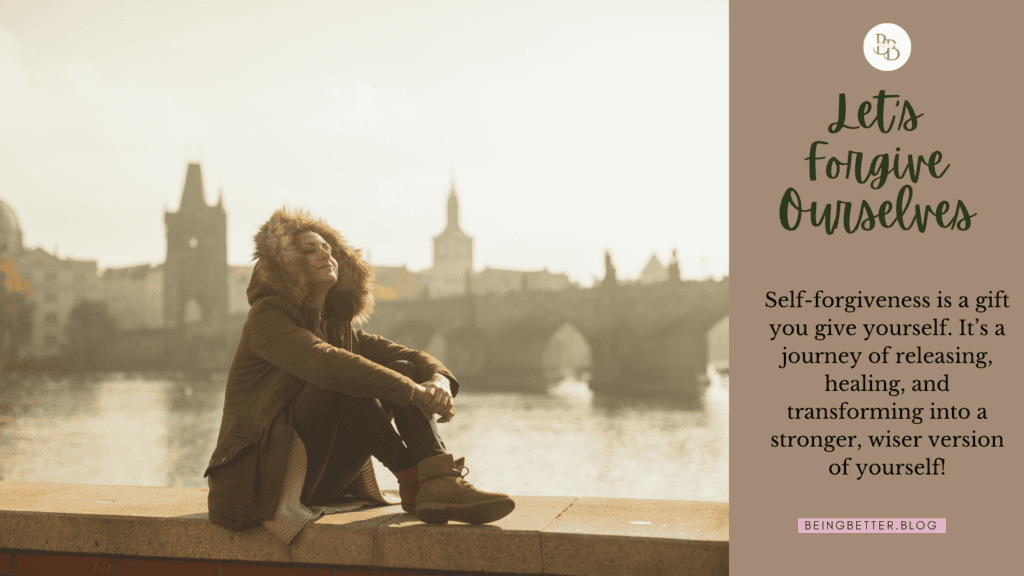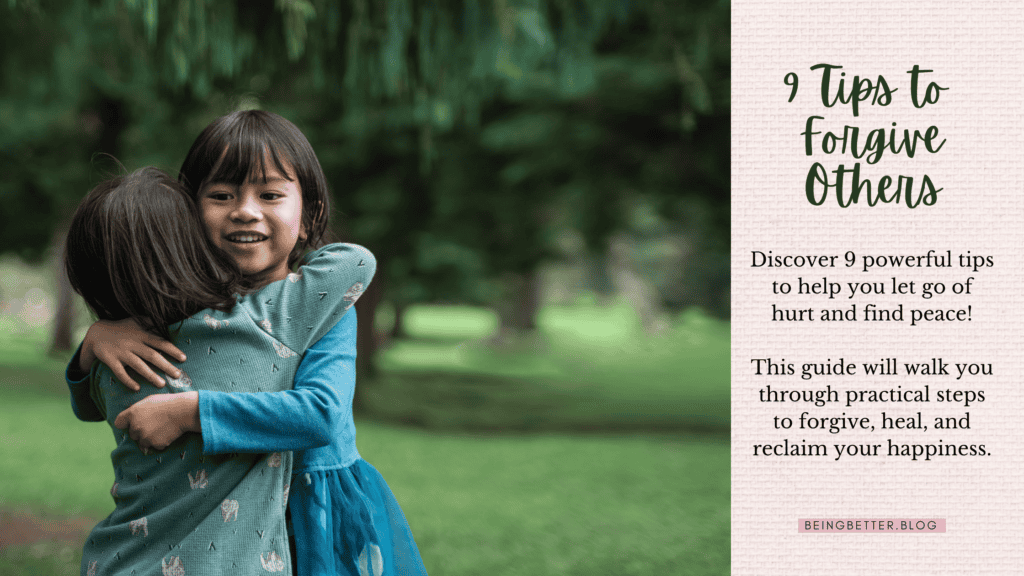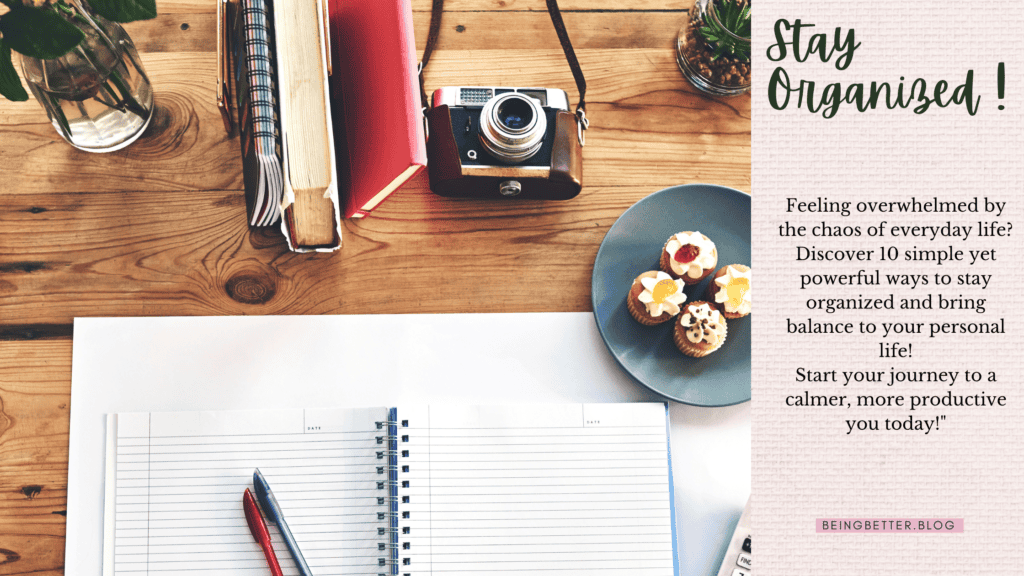Table of Contents
Why Forgiving Yourself is Important & How to Do It
Have you ever found yourself replaying past mistakes on a loop—wondering “what if,” regretting the choices you made, and feeling like you just can’t move on?
Many of us carry silent burdens from our past—mistakes, wrong turns, missed chances—and they can weigh heavily on our minds and even affect our physical health. Guilt, shame, and self-blame can become a part of our daily inner dialogue, holding us back from the peace and happiness we deserve.
For the longest time, I was stuck in that exact place.
One of my biggest regrets was choosing a profession that didn’t feel right for me. At the time, it seemed like the best decision—safe, practical, what everyone expected. But deep down, I always knew it wasn’t aligned with who I really was or what I truly wanted. As the years passed, that decision started eating me up inside. I would lie awake at night wondering if I’d wasted precious time, beating myself up for not listening to my gut, and feeling like I failed myself. It created a storm of self-doubt, sadness, and a constant sense of being “stuck.”
But here’s the beautiful truth I slowly began to uncover—we don’t have to stay trapped in our past.
Self-forgiveness isn’t just about letting ourselves off the hook. It’s about releasing the pain, learning from it, and choosing to grow forward instead of staying stuck. It’s about shifting from shame to self-compassion and from regret to renewal.
Through a lot of inner work, late-night journaling, soul-searching, and deep reflection, I found some powerful practices that truly helped me forgive myself and start healing. They didn’t magically erase my past, but they helped me see it with softer eyes—and they gave me the courage to step into a new version of myself.
And now, I want to share them with you, because if you’ve been holding onto guilt or regret, you deserve a way out too. Let’s walk this journey of self-forgiveness together. You might be surprised by how freeing, empowering, and life-changing it can be.
Why Self-Forgiveness Matters
1. It Frees You from Endless Regret
Let’s be honest—regret can be exhausting. It keeps us stuck in that loop of “I should have done this” or “Why didn’t I do that?” And the more we replay those moments, the harder it becomes to move forward. I’ve spent so much time in that space myself, constantly going back over old decisions like I could somehow change them by thinking about them enough. (Spoiler: it doesn’t work.)
But here’s the truth—forgiving yourself gives you permission to move on.
It’s like putting down a heavy backpack you’ve been carrying for years. Suddenly, you can breathe easier. Instead of getting lost in the “what ifs,” your mind starts shifting toward “what’s next?” That’s when real change begins.
When we let go of regret, we stop draining our energy on the past and start showing up more fully in the present. Life starts to feel lighter, more open, and way more authentic. And honestly, that kind of freedom? It’s everything.
2. Reduces Stress and Improves Mental Health
Did you know that holding onto guilt and constantly beating yourself up can actually take a serious toll on your health?
Studies have shown that chronic guilt and self-criticism aren’t just bad for your mood—they can lead to anxiety, depression, and even physical issues like high blood pressure. I didn’t realize it at first, but that heavy emotional weight I was carrying? It was draining me, mentally and physically.
When we don’t forgive ourselves, we stay stuck in a cycle of negative emotions that just keeps spinning. It’s like being on an emotional treadmill—you’re exhausted, but you’re not getting anywhere.
But here’s the good news: self-forgiveness can break that cycle.
When we choose to let go of self-blame and replace it with understanding and compassion, our whole system starts to calm down. Our stress hormones like cortisol begin to drop, sleep improves, and we start to feel more at ease—emotionally and physically.
It’s amazing what a little kindness toward yourself can do. Peace of mind, better sleep, and a healthier outlook are just the beginning.
3. Boosts Self-Worth and Confidence
One of the most powerful things I’ve learned on this journey is this: You are not your mistakes.
Read that again if you need to. Because so often, we tie our worth to the things we’ve done wrong, and we forget that we’re allowed to be imperfect. We’re allowed to grow.
Self-forgiveness gently reminds us that we’re human—always learning, evolving, and trying our best with the knowledge and tools we had at the time. It helps us separate who we are from what we did. And when that happens, something beautiful shifts inside us.
You start to believe, deep down, that you are still worthy. Worthy of love. Of happiness. Of success.
And that belief? It builds confidence. It helps you hold your head a little higher and trust yourself a little more. Instead of being stuck in fear or self-doubt, you begin to feel empowered to make better choices and embrace new opportunities without dragging your past along like baggage.
Forgiving yourself is not just about healing—it’s about rising.
4. It Improves Your Relationships
Let’s be real—when we’re hard on ourselves, it doesn’t just stay inside.
That guilt and self-blame can start spilling over into the way we treat the people around us. I’ve had moments where I unknowingly pushed loved ones away, not because they did anything wrong, but because I felt ashamed or unworthy. Other times, I found myself being extra sensitive or distant—all rooted in unresolved feelings toward myself.
Holding onto guilt can quietly create walls in our relationships. We might project our pain, avoid connection, or even feel like we don’t deserve love and support. It’s a lonely place to be.
But when we begin to forgive ourselves, something shifts.
We soften. We become more accepting—not just of who we are, but of the people in our lives, too. Self-forgiveness brings self-acceptance, and that acceptance opens the door to deeper, more genuine relationships.
You start showing up as your true self—without the mask, without the fear. You listen better, love more openly, and offer empathy from a place of inner peace. And honestly, the connections you build from that space? They’re real, strong, and truly fulfilling.
How to Forgive Yourself and Move On – 8 Powerful & Practical Steps
Forgiving yourself isn’t about forgetting the past—it’s about choosing to grow from it. Here’s a gentle guide with real, doable steps to help you let go of guilt and embrace peace.
1. Talk to Yourself Like a Friend
We’re often our harshest critics. But what if you spoke to yourself the way you’d speak to someone you love? That kindness can change everything.
How to do it:
Pause and notice your self-talk. Are you blaming yourself, calling yourself names, or replaying the mistake over and over?
Write down those thoughts exactly as they are.
Now, imagine your best friend said these things about themselves. What would you say to comfort them?
Write your response to them, and then read it aloud to yourself.
This helps shift your inner voice from critical to caring. You’ll start seeing yourself with more empathy and softness.
2. List What You’ve Learned
Every mistake brings a lesson. When you shift from “I messed up” to “I’ve grown,” you take back your power.
How to do it:
Write a sentence or two about what happened. Don’t overexplain or judge—just name it.
Now ask yourself:
What did I learn from this experience?
How would I handle a similar situation differently now?
List at least 3 lessons. Even small ones count.
This gives meaning to what you went through and turns guilt into growth. Your past doesn’t define you—how you use it does.
3. Do One Small Kind Act Every Day
Doing good things reminds you that you are good. It shifts your focus from the past to the present and helps rebuild a positive self-image.
How to do it:
Choose one small act each day. It could be:
Smiling at a stranger
Texting someone “I’m thinking of you”
Donating an item you no longer need
Letting someone go ahead of you in line (I am always doing this especially with aged people, and trust me-their little smile-That’s really worthy!)
At the end of the day, write it down. Reflect on how it made you feel.
These tiny acts of kindness become a powerful way to heal, build confidence, and reconnect with your worth.
4. Try the “Forgiveness Letter” Trick
Writing your thoughts allows you to release heavy emotions and begin healing in a personal, safe way.
How to do it:
Start your letter with:
“Dear [Your Name], I know you’ve been carrying this…”
Acknowledge the mistake. Don’t justify it, just accept it happened.
Share how it made you feel, what you’ve learned, and why you want to forgive yourself.
End with a message of release and hope.
Example: “I choose to let this go now. I am ready to grow.”
You can keep the letter, burn it, or even tear it up—whatever helps you feel lighter.
5. Create a “Self-Compassion Jar”
We all need reminders that we’re growing and worthy. A self-compassion jar keeps track of your progress and lifts you up when you’re feeling low.
How to do it:
Find any jar, cup, or small box. Decorate it if you’d like.
Each day, write one positive note to yourself:
“I’m proud of how I handled today.”
“I took a small step forward, and that’s enough.”
“I’m learning to be kinder to myself.”
Fold the note and drop it in the jar.
On hard days, open your jar and read a few notes. You’ll see that you are changing and that you deserve forgiveness.
6. Set a Tiny “Moving On” Goal
Forgiveness isn’t just emotional—it’s also action. A small, fresh goal helps you feel in control again.
How to do it:
Pick one mini-goal for the week. For example:
Walk for 10 minutes each day
Drink more water
Start reading a new book
Try journaling every morning
Write it down and check it off each day.
Don’t worry about perfection. Just showing up counts.
This reminds you that life is still moving forward—and you’re moving with it.
7. Talk to a Real Person
Sometimes, we just need someone to remind us that we’re not alone and we’re not as “bad” as we think.
How to do it:
Reach out to someone you trust. This could be a friend, family member, mentor, or therapist.
Say something like:
“I’ve been really hard on myself about something I did. Can I talk to you about it?”
Let them listen. You don’t need advice—just connection.
Hearing someone say “I understand” or “I still love you” can be incredibly freeing and healing.
8. Forgive Yourself Out Loud
Words are powerful—especially when spoken out loud. They help your mind and body feel the message more deeply.
How to do it:
Stand in front of a mirror. Take a deep breath.
Look into your eyes and say:
“I forgive you. You did your best. You’re growing. I love you.”
Repeat it daily. It might feel awkward at first, but it gets easier.
Over time, these words plant seeds of peace in your heart.
Hey! The New You!
Self-forgiveness is a gift you give yourself. It’s a journey of releasing, healing, and transforming into a stronger, wiser version of yourself. If you’re struggling with guilt or regret, know that you are not alone. Take small steps each day, be patient with yourself, and trust that you are capable of growth and renewal.
Are you ready to start forgiving yourself and embracing inner peace? Let’s take this journey together. 💙



